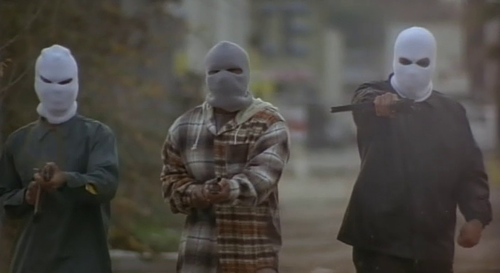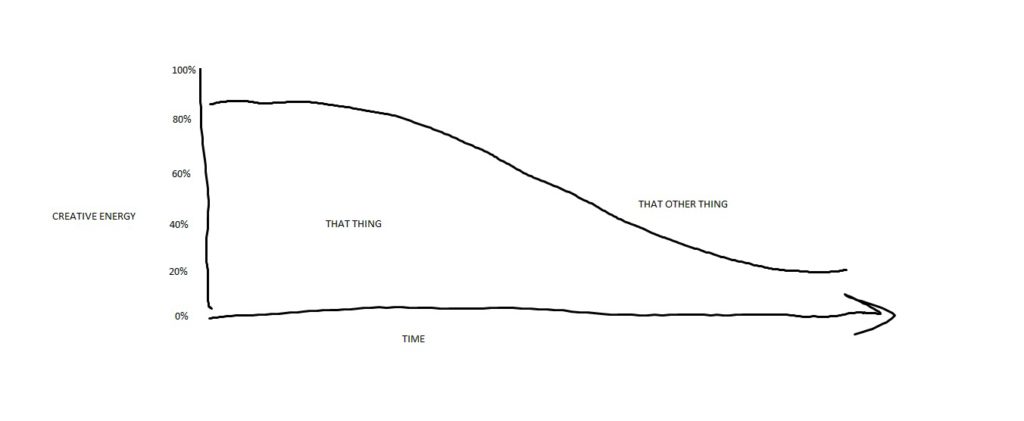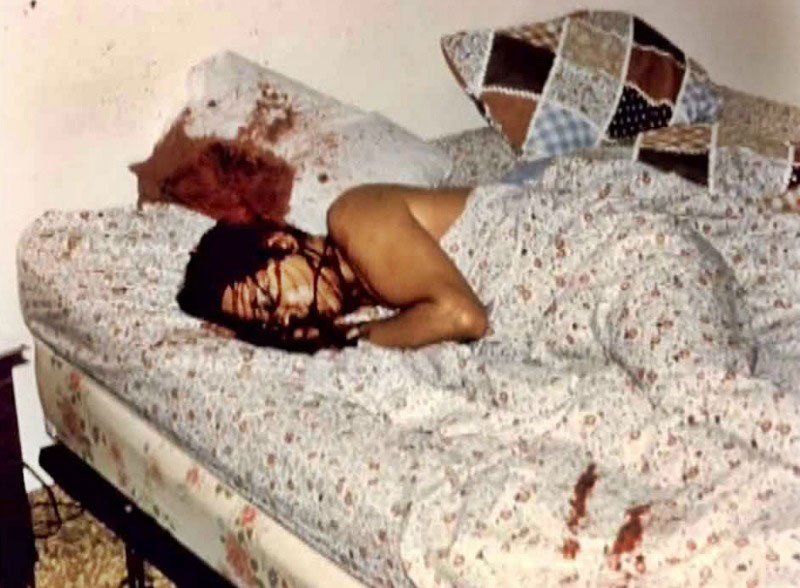Kill the Hostages

It’s Tuesday, right before lunchtime, and you’re headed to the bank to make a deposit from the weekend. The sun is shining and it’s one of those warm fall days when the larch needles are a singing kind of yellow and a breath of frost has whispered across the ridgelines and peaks of the horizon. It’s your father’s birthday today, and you make a note to call him.
You tuck the money pouch into a folded newspaper and pull the heavy door before stepping into the marble lobby. There is a line; you wait. Your phone battery is dead, so you’re left to gape dumbly around the room as your ancestors have done for generations to while away a queue. You had not noticed before that the cherub ceiling mural really is quite sexually explicit for an institution such as a bank.
The woman behind you in line is a mouth breather in too much perfume. In front of you a man seems to be negotiating the terms of a divorce in a hoarse, heated whisper that is anything but private. And so you can be forgiven for not noticing the four men with rifles who slipped in behind you and chained the door closed until you are lying on your stomach with a gunbarrel to your head.
The man with the gun tells you not to look at him, but you catch a glimpse of desperate, bloodshot eyes twitching through the holes of a ski mask. He faintly smells of vodka from a plastic bottle. You can’t be sure he isn’t drunk. You consider reaching for the revolver in your sock, but decide that it’s unwise. These men will come and go, everything will be fine.
Tuesday at lunch is a poor time to rob a bank. In the first five minutes of this bungled heist seven people try to enter the lobby. Finding it locked they peer in through the glass doors to see masked men and black rifles and two dozen people lying on their bellies. You don’t believe that any kind of silent alarm was even necessary; the police surround the building before all of the tellers are even sprawled across the cool stone floor.
The men with guns are more nervous. You see them huddled in front of the safe and they seem to be arguing. Things are not going according to the plan, if there was a plan at all.
Time passes and the sun goes down, the gunmen speak with the police on one of the bank’s phones. Pizzas come and are taken away and the masked men grow more agitated. After a while one of them begins yelling into the phone that if the police do not cooperate he will kill the hostages. Power in the building goes out and for a moment the room is completely dark. You wonder if now is the time to act. Your pistol carries six rounds, there are four of them. They are standing together, vulnerable. Their backs are turned.
The first hostage they shoot is the man who was in front of you in line. He is not tall but handsome, one of those guys who went grey in his 30s and carried it off. The bullet takes away most of the top half of his face as it leaves his skull just below his left eye. He is followed by a red streak as he rolls down the front steps.
Two more customers are shot, and it seems that a SWAT team will come through the doors, or the windows, or the ceiling at any moment. Instead it is silent except for the sobbing of the people on the floor. The system isn’t working.
You wait, but begin inching toward your pistol. It occurs to you that help is not coming. It is up to you to act. And as you sit and ponder how to do so, another man is shot and rolled out into the street.’
LikeGun Control

So there was another mass shooting. Well, actually there have been six of them in the last week, but we’re still talking about the big one. In Vegas. You remember. An act of violence on that scale has the unique ability to galvanize the public, to bring us together and offer a moment of clarity. In this case it seems we might see eye-to-eye on a piece of gun control legislation. Even the NRA is willing to listen*. Wow.
Of course the idea that restricting access to bump stocks constitutes meaningful gun control (or, really, gun control at all) is laughable. It reeks of the aftermath of the Charleston massacre, when right wing politicians in the employ of the gun lobby rushed for any scapegoat that might be accepted by the left, and settled on removing Confederate flags from state buildings. It is certainly a good idea, and certainly not a real response to either a specific act of violent white supremacy or gun violence in general.
But even when our consensus on what to do is wan and fragile, large scale shooting attacks captivate us. We remain fixated on the 24 hour news cycle as the perpetrator’s third grade girlfriend says in an interview that she never saw it coming and false flag conspiracy theories crop up before the barrels or the bodies have cooled. Ending mass shootings by military weapons is as easy as restricting civilian access to military calibers, but ignores a few grim realities (not the least of which is that we simply don’t care to act).
Banning guns relegates violence to the domain of the state, and ours is a nation where still, in 2017, a person’s skin color is as dangerous in the eyes of the police as a weapon. We elected an autocratic, Nazi sympathizing president who promises to parade our military through the streets as a show of force. Call me a gun nut. Call me paranoid. I’m uncomfortable with a state monopoly on death.
And then of course there is the reality that the dramatic, galvanizing shooting incidents happen only a few times a year**, and that the overwhelming majority of gun violence occurs at an upbeat cadence of ones and twos until we see tens of thousands of Americans fall each year at the hands of their countrymen. This truth yields cries of “black on black” murder from right wing racists who are bad at statistics, but the fact remains that most people are killed by someone they know.
Any earnest discussion of solutions requires acknowledging the scale of the challenge. Guns outnumber people in the US, and are firmly entrenched in our national identity. Any effort to confiscate these weapons will play into the narrative of the militant right and probably catalyze a civil war (we’ve seen armed insurrection for far less go unpunished). Tempering the manufacturing and sale of new weapons will take decades or generations to have a palpable effect on firearm ownership. Even passive regulation curtailing new sales would require legislation dramatically more profound than we could muster after 20 children were gunned down at Sandy Hook Elementary School. The simple fact is that for the foreseeable future***, the NRA has won. Guns are here to stay; what’s left is how we use them.
America’s culture of violence is bred in the disparity between our national premise that hard work will yield success and the reality that for most of us it simply isn’t true. Murder is the tool of kings and desperate men, and our social and economic policies of the last 80 years have sown large swaths of desperation across our city centers and rural communities.
Violence in America is about much more than access to guns. It’s about access to healthcare. Access to education. Access to real jobs and an answer to the promise of the American Dream. If we’re serious about addressing gun violence in a meaningful way the conversation cannot begin with esoteric modifications or the vague, cowardly scapegoat of “mental health,” whatever that means from the lips of a politician.
To address gun violence in America we need to address America’s culture of violence, and to address that culture we need to confront the atmosphere of hopeless resignation that afflicts the disenfranchised. This begins by recognizing that our democracy is broken, that what we have for government looks much more like a plutocratic monarchy, ruling on behalf of the rich. We will not see an end to gun violence until class mobility becomes a reality for all Americans and healthcare is, if not a human right, an essential pillar of our social contract. The end to gun violence lies in demonstrating that we truly are created equal, and a government that protects egalitarian ideals.
Gun violence is impossible without guns, but violence itself is born from scarcity and desperation. These are the most productive, prolific years of human history, and there is no excuse for either.
**That’s it! Why is everyone so worked up?
***One thing we actually can do is to pressure the news media to publish crime scene photographs and video. We live in an insulated fantasy world shaped by John Wayne and Michael Bay. The reality of gun violence is easily lost on those who it doesn’t touch in a personal way. Let’s change that.
LikeA Broken Nation
This post was initially intended as a thought experiment in bicycle commuting, which to those of you who frequent this page should not come as a surprise. Each day we take our lives into our hands and gamble with it before would-be assailants in 5,000lb murder rockets. In the doldrums of our shared commute the aggressive and the oblivious meld into a tapestry of people trying to kill a vulnerable man.
The question, then, was whether the Castle Doctrine applies to our tiny slice of the road. Whether we, as cyclists, have a duty to retreat, or if, when an attempt is made on our lives by a passing motorist we may return fire under protection from the law. It was meant to be funny. Biting. True.
In light of the last 36 hours that seems in poor taste.
Instead we’re left with a kind of dull, hollow feeling that comes from the melange of anger, fear, heartbreak, and, ultimately, resignation that we, nationally, are unmoved by 600 partygoers being shot by a single man.
59 bodies are barely cool, but we carry with us the warmth of a president’s condolences, delivered 200 characters at a time. Brevity, it seems, is not only the soul of wit. And then after thoughts and prayers comes the tedium of parsing personal histories and allocating blame – bickering as we retreat to our partisan bastions and shield ourselves from the truth that ours is a broken nation.
That we do not care for the heartache of others. That until we are affected in a real and personal way there will be no change. That only when a majority of us are touched by violence will we move to make it right, and the chilling reality that that future is, perhaps, not so far off.
From those with the power to change we have warm condolences. We have thoughts and prayers. We have the knowledge that we will be judged harshly by history for deliberate inaction.
My warmest condolences and sympathies to the victims and families of the terrible Las Vegas shooting. God bless you!
— Donald J. Trump (@realDonaldTrump) October 2, 2017
The world will little note, nor long remember what we say here, but it can never forget what they did here. – Abraham Lincoln
Like



